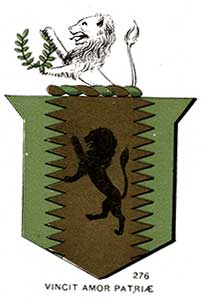The O’Hara Family

(Crest No. 276. Plate 43.)
THE O’Hara family is descended from Milesius, King of Spain, through the line of his son Heber. The O’Haras belonged to the Kianachta tribe, so named from its founder Kiann, son of Olliol Ollum, first absolute King of Munster, A. D. 177. The founder of the family was Eadrach, signifying “Severe.”
The title of the chiefs of the sept was Lord of Lieney, and their possessions were located in the present Counties of Sligo, Mayo, Donegal, and Antrim. Lieney anciently comprised part of the baronies of Costello and Gallen in Mayo. The O’Haras took their name from one of their chiefs, lord of Lieney, in the tenth century. From the twelfth to the seventeenth century they held their rank as lords of Lieney, and had large possessions to the period of the Cromwellian wars. They are thus designated by O’Dugan:
“The lords of Lieney, of high fame;
The men of Lieney, of warlike swords.”
In the reigns of Queen Anne and George the First, the O’Haras were created “Barons of Tirawley and Kilmaine,” in the County Mayo.
Sir Charles O’Hara, Baron Tirawley, born in the County of Mayo, in 1640, was distinguished in the War of the Spanish Succession. He commanded the left wing of the allied armies at the battle of Almanza. His son attained the rank of General, filled many important posts, was Governor of Minorca, and was created Baron of Kilmaine, for his military services.
Kane O’Hara, a musician and author of many comic operas, was born in the early part of the eighteenth century, and died in 1782. He was mainly instrumental in founding the Dublin Musical Academy, in 1758, and was its first vice-president. The name is still numerous in Ireland, and in the United States. The well-known American poet and soldier, Colonel Theodore O’Hara, author of “The Bivouac of the Dead,” one of the finest martial lyrics in the English language, was a descendant of this ancient Irish family. He served with credit in the Mexican War, and afterward served on the Confederate side in the late Civil War. He was on the staff of Gen. Albert Sidney Johnson; and that officer died in the arms of O’Hara, at the battle of Shiloh. The body of O’Hara was removed from the State of Alabama, where he died, to his native State by the Legislature of Kentucky a few years ago, and interred in the State cemetery, at Lexington, where a public monument was erected to his memory.
